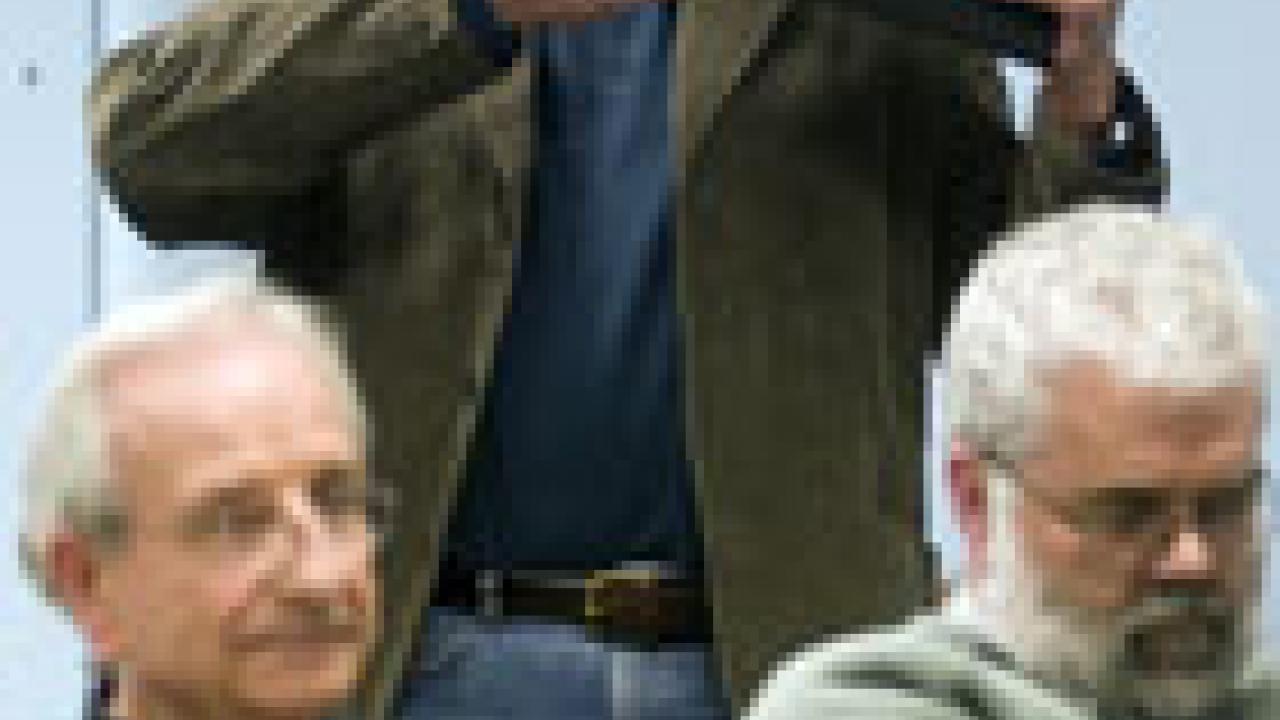Ballots were due to arrive in Academic Senate members' mailboxes today for a vote that has never occurred before at UC Davis: Should the senate declare that it has no confidence in the chancellor?
In recent weeks, Larry Vanderhoef has been criticized for his handling of the resignation last summer of University Relations Vice Chancellor Celeste Rose. She was given a two-year appointment as senior advisor to the chancellor at an annual salary of $205,000 plus benefits, plus $50,000 for transition expenses. The agreement did not become public until a newspaper report in December.
On Tuesday afternoon, at a town hall meeting called by senate leaders to discuss the pending vote, faculty members voiced their dissatisfaction with those actions and many others. About 45 of the 2,500 senate members turned out for the hourlong forum in the Memorial Union's East Conference Room.
Frustration with Vanderhoef and the University of California administration in general spilled over from the faculty members, regardless of whether they declared themselves to be for or against the no-confidence measure. They vented about "profound demoralization," poor leadership, "cronyism to the max" in the administration, inadequate graduate student support, faculty salaries, the "disaster of undergraduate teaching" and other matters that they said are detracting from the UC Davis mission.
Where the speakers differed was whether a no-confidence vote against Vanderhoef linked to the Rose agreement was the proper vehicle to express their dissatisfaction.
"This is the wrong battle," said Judy Stern, a professor of nutrition. "If this passes, we'll look like chumps, we'll look petty and foolish, because we're not dealing with the overall problem of where is this university going. You can't make something about Celeste Rose fix everything with respect to the university."
Marty Privalsky, a professor of microbiology in the College of Biological Sciences, responded: "This may not be the ideal approach, but it's got their attention. We feel the university has lost its way."
Vanderhoef, chancellor since 1994, did not attend the town hall meeting. He has said publicly that after he asked her to resign, Rose accused him of gender and racial discrimination — charges he denies.
Vanderhoef has said he negotiated the best agreement he could with the information available to him at the time, hoping to avoid the financial and political impacts of a lawsuit and the damaging effects of discrimination charges on recruitment and retention.
At Tuesday's town hall meeting, Vicky Smith, a sociology professor, said she opposed the no-confidence vote: "I do not think we are in a position to make a judgment about what happened in this case."
School of Medicine professor Jerold Theis, who drew up the petition and collected the 56 signatures that led to the vote, said Vanderhoef and the university should have fought Rose's charges. Theis called the chancellor "eminently defendable," based on his record of placing women in top administrative posts and being a "strong advocate" for diversity. By negotiating a settlement, Vanderhoef "failed to protect the university's principles," Theis said.
Charles Hunt, a professor in the Department of Electrical and Computer Engineering, said Vanderhoef was guilty of "persistent deception."
The chancellor has said that the agreement was not a secret to the UC general counsel's office, which assisted the campus throughout the negotiations. The counsel's office has since said that it should have brought the matter to the Board of Regents.
Sociology professor Bruce Haynes said he was concerned that a claim of racial discrimination was not given the chance to be heard. "The big elephant in the room for me is the fact that we haven't discussed the fact a senior, female, African-American administrator" accused the university of discrimination.
Theis made up one half of a panel that opened the town hall meeting. Veterinary medicine professor Philip Kass was the other panelist and called the pending vote "a symbolic gesture of frustration aimed at the wrong target," saying, "A malignant preoccupation with the welfare of executives at the expense of the rest of us has led UCOP to a serious disassociation from the realities of maintaining a world-class university."
Law professor Dan Simmons, chair of the Academic Senate, said after the town hall that the faculty is frustrated with the executive compensation controversy embroiling the UC system, and their frustration is coming out in the vote on Vanderhoef.
The terms of Rose's reassignment call for her to work on "mutually agreed upon" projects. This week, Assistant Chancellor Maril Stratton said Rose is currently completing an analysis of a consultant's recent report on the prospects for UC Davis's proposed comprehensive fundraising campaign.
Media Resources
Clifton B. Parker, Dateline, (530) 752-1932, cparker@ucdavis.edu
